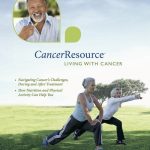
Angela Hummel, MS, RDN, CSO, LDN
For cancer patients and survivors, learning what to eat for the energy they need and to support their treatment can be powerful medicine. Fortunately, an increasing number of clinics have specialists in oncology nutrition who help patients navigate the often complex diet needs. I talked with one of these experts, Angela Hummel, about helping people with cancer do just that.
What do patients ask you the most?
People really want to know what’s the best thing to eat for fighting cancer. Although there’s no one answer, I encourage patients to focus on eating as healthy of a diet as they can. Getting enough nutrients is key to support a strong immune system and to repair your body. Patients and caregivers can get creative and make eating more enjoyable by making smoothies, flavorful soups or foods that are easy to to eat, like muffins.
How does a certified specialist in oncology nutrition (CSO) work with cancer patients and survivors?
A CSO is the expert on how nutrition affects cancer – from prevention to treatment and survivorship. So I help patients navigate their special diet and nutrition needs, as well as manage side effects from cancer therapies (surgery, chemotherapies, biotherapies and radiation).
I’ve always been drawn to working in oncology. I enjoy guiding people through the nutritional changes they can make to alleviate symptoms of treatment and then help them develop cancer survivorship plans. In my experience those with a cancer diagnosis are often driven to make healthy changes in their lifestyle.
“I encourage patients to focus on eating as healthy of a diet as they can. Getting enough nutrients is key to support a strong immune system and to repair your body.”
Do you have favorite recipes?
Yes! Here are some AICR recipes I recommend to patients:
- Comfort food: Turkey Pot Pie with Cornbread Crust
- Quick and visually appealing: Raspberry Almond Muesli
- Easy recipe: Banana Oatmeal Muffins
- Soothing: Chicken Soup with Buckwheat and Berry Yogurt Popsicles
What is the biggest misconception you hear about what people should eat (or do about diet) during treatment?
I often hear “eat whatever you want” during cancer treatment and avoid losing weight. It’s a misconception that all people with cancer need excessive calories and should not lose weight. Depending on the type of cancer and with the guidance of your healthcare team, a purposeful weight loss of no more than 2 pounds per week through healthy diet changes and physical activity can be beneficial. (AICR has found that overweight increases risk for several cancers.)
How can cancer patients find help with diet and nutrition?
Find out if your cancer center has a dietitian who specializes in oncology if you are going through cancer treatment or you are a cancer survivor who has completed treatment. The Academy of Nutrition and Dietetics has an option to search for a dietitian in your area. The search box can be limited to dietitians working in oncology.
Cancer Resource comprehensive toolkit provides guidance to help cancer patients and their families cope and recover from a diagnosis.
For this and other resources for patients and survivors from AICR.
Anything else you’d like to add….
AICR Recommendations are so great to help people put cancer prevention and survivorship steps into action. I like having specific guidelines that help patients and their families know what they can do to protect themselves. I hear from other RDs (Registered Dietitians) all the time how much they use AICR information. The handouts I use the most are CancerResource and the brochure on Red and Processed Meat.
About Angela Hummel, MS, RDN, CSO, LDN: Angela is passionate about helping people make positive diet and physical activity changes, whether to reduce cancer risk or for healthier survivorship. She initiated and developed two oncology nutrition programs in cancer centers. Angela also uses her expertise with two AICR programs – the New American Plate Challenge, and the Nutrition hotline.






 Cancer Resource comprehensive toolkit provides guidance to help cancer patients and their families cope and recover from a diagnosis.
Cancer Resource comprehensive toolkit provides guidance to help cancer patients and their families cope and recover from a diagnosis.
I am fortunate that I am an instructor at a medical school ( DO) — what do you all think it is most important for doctors to know about nutrition and cancer and how to communicate to their patients?
jdsw, RD, CDE, LD, MPH
Here is Angela’s response:
Hello, It is wonderful that you have the opportunity to train future physicians on nutrition. These students will end up in a variety different areas of medicine, for that matter, I would focus on cancer prevention and the benefit of good nutrition. Our AICR Can Prevent website has great information to teach http://www.aicr.org/can-prevent/what-you-can-do/10-recommendations.html. From my experience working with physicians in oncology, physicians need to know that good nutrition is a priority when a person is going through cancer treatment. Encourage them to get rid of the “eat whatever you want” mentality and instead adopt a “nutrition matters” mentality. Nutritional needs change dramatically throughout cancer treatment. For this reason, encourage them to work with their local dietitian for the patient and as a resource to educate themselves. We also have a hotline at [email protected] for future questions from you and your students.